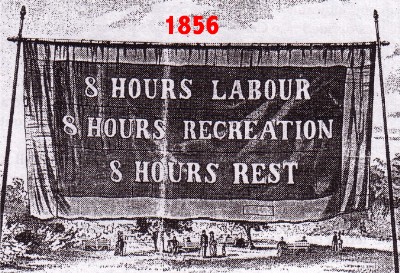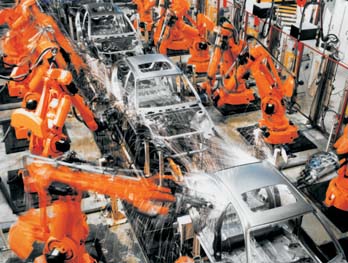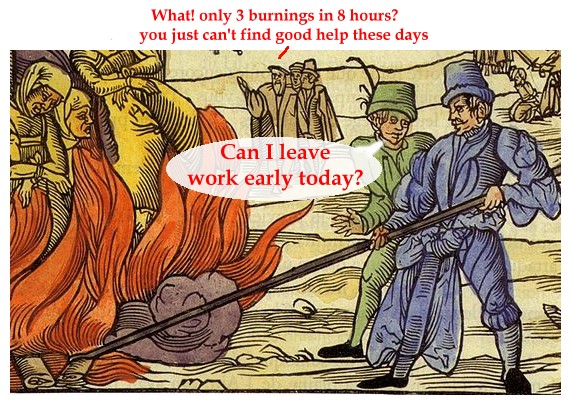Questions on Work
by Sam Alexander of xamuel.com
July 13,2010
(Illustrations added)
Connect with XamelA on Twitter
Is there a certain optimal work week length?

Of course, different jobs require different amounts of work, but I'm talking about on average. In the U.S. right now, there's supposedly an average work week of around 40 hours a week.
If so, should it depend on the state of technology?

This comes down to what the point of work is. Is the primary point to keep people feeling like they're contributing to society? Or is it to do so much "stuff", which could in principle be done very quickly with more advanced technology. Is it about competing and keeping up with everybody else, in which case new technology raises everyone's productivity uniformly, like playing baseball in a stadium with a shorter wall? Or is the point of work some combination of these and maybe other factors?
If X hours is optimal, what happens at X±1?
If we answer yes about there being an optimal average workweek, how does that gel with the Paradox of the Heap? (The Paradox of the Heap, or Sorites Paradox, goes as follows: one grain of sand is not a heap. If X grains of sand isn't a heap, then certainly X+1 grains of sand isn't a heap either. By induction, doesn't this mean no amount of sand makes a heap? Now replace "sand" with "seconds spent working per week")
If forty hours a week is optimal, will a thirty-nine hour civilization crumble or suffer?
Is it virtuous to work?
Is work, as an abstract concept, inherently virtuous?

illustration by C.L'Hirondelle
2010
What if the work itself is unethical?
Is it virtuous to work for a payday loan office? A predatory towing company? A mob boss? A church? The Church of Scientology? The government? Is there a "line" separating virtuous work and non-virtuous work, and if so, where?
Should policy-makers try to rescue all jobs, or just good jobs?
What if a job has harmful effects, like mountaintop removal coal-mining or deep-sea oil drilling? What about jobs which aren't shady at all, but just suck for the worker, jobs with terrible working conditions?
What if saving one job dooms another?
Company X designs robots to automate jobs in other industries. This takes a long time, and in the short run, Company X is in danger of going bankrupt. If Company X goes bankrupt, it will put thousands of engineers out of work. Should policy-makers intervene to save Company X?
Is it better to create make-work, or just give money away free?

What are the benefits of paying person A to dig ditches, and paying person B to fill them back in? What are the benefits of paying person A and person B what you'd have paid for that "work," for free?
If work is fun, is it still work?

Certain people do work for reasons other than a paycheck. e.g. Is editing Wikipedia a job? Would the answer change if editors received a modest stipend? A comfortable salary? Does the very existence of Wikipedia demonstrate that mankind tends to create value even without a paycheck?
What would retirees-who-work-for-fun do if work were abolished?
Besides editing Wikipedia, I mean...
In an unemployment crisis, is it ethical to hire the wealthy-who-work-for-fun?
Is it ethical not to hire them, i.e. would that be "wealth discrimination"? Assume that the wealthy candidate and the regular candidate have totally equal qualifications, even after taking into consideration the productivity pro's and con's of being wealthy vs. being not.
How does the answer change if one of the candidates is a friend of the boss, or a relative of the boss?
Is parenthood a job?

SB1982VanBC
Does the answer change if the parent receives a stipend for raising the children? If parenthood is not a job, then is "nanny" a job, and if so, why? If a mother is forced to either raise her own child, or abandon her child to raise someone else's, which choice is better for society? What about if a father has to choose between raising his child or working at a fast food restaurant?
Some people desperately want to feel like they're contributing to society...
For example, this is common among people labeled with mental problems. These people will often struggle to find any work, doing volunteer work in the meanwhile, and then eagerly work any job with a paycheck, glad to be acknowledged as useful members of society. If work is abolished, what would the implications? Should we create make-work to let people feel acknowledged? Is that condescending? How else can people who feel marginalized by mainstream society find ways to feel appreciated and useful, besides employment?
Should anyone be "forced" to work?
If so, who? How should we determine who is forced to work and who is allowed to not work, if they don't want to?
Is it ok to separate society into groups and force one to work and not the other?
What if those groups aren't defined by race, but by more abstract criteria? What if Group A is the group of poor people and Group B is the group of rich people?
Should people be allowed to quit their jobs?
Under what circumstances? Should a fast food worker be allowed to quit? What about a soldier? Should a soldier be allowed to quit if he feels he's given an unethical order? Should an office worker be allowed to quit if his boss wants him to relocate? Should a police-officer be allowed to resign during a period of rioting? Should a client be allowed to change his mind about a contract? How does the client-contractor relationship differ, in this respect, from the worker-boss relationship?
If a man or woman is free to not work, but then will starve, is this then really being free?
How about if that person owns a farm, and by choosing not to work, he/she would make others starve? How do the questions change if "starve" is replaced by "suffer humiliation"?
How do any of these questions change depending whether there's a job shortage or a labor shortage?
Just some things to think about......
?????????????????????????????????
Reprinted with permission from xamuel.com